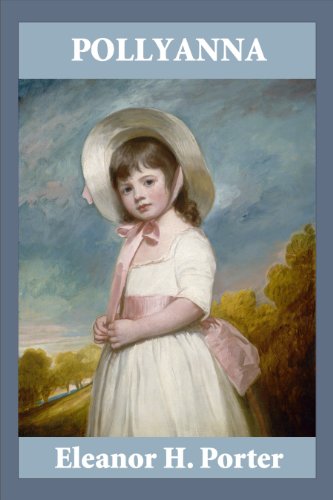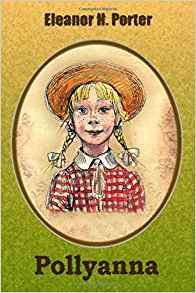-
Pollyanna
Eleanor H. Porter, Kathleen Olmstead, Rebecca K. Reynolds
Audio CD (Oasis Audio, July 28, 2020)Following Sterling's spectacularly successful launch of its children's classic novels (240,000 books in print to date),comes a dazzling new series: Classic Starts. The stories are unabridged and have been rewritten for younger audiences. Classic Starts treats the world's beloved tales (and children) with the respect they deserve. “Once you start looking for the happy things, you don’t think about the bad ones as much.” That’s the joyful way Pollyanna sees the world: no matter what happens, she plays her “Just Be Glad” game and finds the sunny side of any situation. But when she’s orphaned and forced to live with her rigid Aunt Polly, will high-spirited Pollyanna succeed in melting her Aunt’s cold heart? M
M
-
Pollyanna
Eleanor H. (Eleanor Hodgman) Porter, D. Fog
eBook (, Feb. 8, 2016)Pollyanna is a best-selling 1913 novel by Eleanor H. Porter that is now considered a classic of children's literature, with the title character's name becoming a popular term for someone with the same very optimistic outlook. Also, the subconscious bias towards the positive is often described as the Pollyanna principle. The book was such a success that Porter soon produced a sequel, Pollyanna Grows Up (1915). Eleven more Pollyanna sequels, known as "Glad Books", were later published, most of them written by Elizabeth Borton or Harriet Lummis Smith. Further sequels followed, including Pollyanna Plays the Game by Colleen L. Reece, published in 1997.
-
Pollyanna
Eleanor H. Porter
Paperback (Digireads.com Publishing, April 9, 2018)First published in 1913, “Pollyanna” is Eleanor H. Porter’s popular tale of youthful exuberance that has been cherished by young readers ever since its first publication. A classic of children’s literature, “Pollyanna”, is the story of its titular character, Pollyanna Whittier, a young orphaned girl who moves to the fictional town of Beldingsville, Vermont, to live with her cold and stern spinster Aunt Polly. Pollyanna’s aunt is not keen towards the idea of having to take her in but does so anyway out of a sense of duty to her late sister, Pollyanna’s mother. Pollyanna’s eternal optimism arises out of a game she would play with her father in which they would try to find the good in all situations. Her sunny disposition soon begins to infect the otherwise dispirited New England town which she know calls home, transforming it into an increasingly pleasant place to live. However when tragedy strikes she is finally challenged with a situation in which she cannot be happy about and the townsfolk are called to rally to her side to help her regain her positive outlook on life. This edition is printed on premium acid-free paper.
-
Pollyanna
Eleanor H. Porter, Stockton Mulford
eBook (EirenikosPress, April 1, 2013)Orphaned Pollyanna arrives in Beldingsville with nothing but a joyous outlook on life that chooses to see the positive side of every situation. Her “Glad Game” begins to affect the lives of everyone around her. A bitter Aunt, a neglected precocious boy, an eccentric recluse, a confused minister, and an imagined invalid, are all changed for the better. Joy can be contagious. Illustrated.
-
Pollyanna
Eleanor Porter, G. B. McIntosh, Michael Marshall, Lucy Russell
eBook (Core Knowledge Foundation, Nov. 28, 2012)Stories loved for generations come to life for today's young readers in the Core Classics series. Faithful to the style, plot, and themes of the originals, Core Classics are designed for use as classroom editions of the literary works listed in the Core Knowledge Sequence. They include introductions by E. D. Hirsch Jr., editor of the Core Knowledge© Series (What Your Kindergartner — Sixth Grader Needs to Know).The Core Classics are generally considered suitable for fourth and fifth grade students. The texts are illustrated, annotated, and include a brief biography of the author.From the Introduction:When Pollyanna was published in 1913 it created an amazing sensation among readers and rapidly sold more than a million copies. People were very attracted to the story’s cheery main character. They wished they had her outlook on life.Since then, Pollyanna’s name has become a word in the English language that is used to mean someone who tries to find good in everybody and every situation, someone whose optimism is so blind that it seems a little silly.Pollyanna’s story is not that of a pampered princess, but a lonely orphan. In her young life she has already faced too many sad facts to think that all of life is happy or easy. When she stops to play what she calls “the glad game,” it is not out of fun. She hopes to find a silver lining in a stormy cloud overhead, a consolation for a hard blow. No one has harder blows to cope with than Pollyanna does, and being cheerful is not easy for her either.Pollyanna believes that everyone naturally wants to be good, because it’s by being good that we are most likely to be happy. So she tries to help others to look for good, especially when things seem only wrong. Her message is familiar: when life is disappointing or even painful, stop and count your blessings. There are still things to be thankful for.
-
Pollyanna
Eleanor H. Porter
eBook (, Aug. 9, 2014)Pollyanna is a work by Eleanor H. Porter. This edition includes 10 illustrations.
-
Pollyanna
Eleanor H. Porter, Imogen Russell Williams
eBook (Macmillan Collector's Library, May 3, 2018)Designed to appeal to the booklover, the Macmillan Collector's Library is a series of beautiful gift editions of much loved classic titles. Macmillan Collector's Library are books to love and treasure.With its wonderfully infectious good cheer, Pollyanna by Eleanor H. Porter spawned a real-life ‘Glad’ movement and endures today as a true classic of children’s literature. This elegant Macmillan Collector’s Library edition features an afterword by children’s book critic Imogen Russell Williams.When her beloved father dies, Pollyanna is sent to live with her strict Aunt Polly in the dour town of Beldingsville, Vermont. Luckily, Pollyanna has the Glad Game – a joyous, warm-hearted exercise where she finds the best in every situation. Whether delighting in the view from her bare attic room, or interpreting her punishment of a meagre supper as a wonderful treat, Pollyanna cannot help but see the best in the world, and inadvertently changes it for the better as she goes.
-
Pollyanna
Eleanor H. Porter, Marion Dane Bauer
Paperback (Aladdin, Feb. 1, 2002)Pollyanna's eternal optimism has made her one of the most beloved characters in American literature. First published in 1913, her story spawned the formation of "Glad" clubs all over the country, devoted to playing Pollyanna's famous game. Pollyanna has since sold over one million copies, been translated into several languages, and has become both a Broadway play and a Disney motion picture. P
P
-
Pollyanna
Eleanor H. Porter
eBook (Vintage Digital, June 4, 2015)THE COMPLETE AND UNABRIDGED TEXT'Most generally there is something about everything that you can be glad about, if you keep hunting long enough to find it'When her father dies, Pollyanna is sent to live with her stern Aunt Polly. She is poor, orphaned and alone but Pollyanna just feels lucky to have an aunt at all. The truth is that her dear father, before he died, taught her a trick for life – the 'Glad Game' – the aim of which is to find the good in every bad situation. Before long, Pollyanna’s sunny outlook has brightened up the whole town. But when a horrible accident occurs can the Game save Pollyanna?Includes exclusive material: In The Backstory you can test your knowledge of the book and find out if you’re as optimistic as Pollyanna! Vintage Children’s Classics is a twenty-first century classics list aimed at 8-12 year olds and the adults in their lives. Discover timeless favourites from The Jungle Book and Alice’s Adventures in Wonderland to modern classics such as The Boy in the Striped Pyjamas and The Curious Incident of the Dog in the Night-Time.
-
Pollyanna
Eleanor H. Porter
Paperback (CreateSpace Independent Publishing Platform, Sept. 18, 2018)This is a timeless classic expressing the universal message that every aspect of life should be looked at in a positive way. It follows the actions of its protagonist, eleven-year old Pollyanna who goes to live with her stern Aunty Polly, where she faces many challenges with a smile on her face. The best-selling novel begins with the introduction of Pollyanna who goes to live in Vermont with her strict Aunt Polly after the death of her parents which have left her an orphan. The young heroine refuses to give in to her seemingly gloomy situation and instead chooses to look at the bright side of things.Pollyanna’s adjustment to her new surroundings is determined by her optimistic philosophical approach to life, which she refers to as “The Glad Game”. A game taught to her by her father, it has one simple rule- to find the silver lining in every cloud, and find a reason to be glad in every situation whilst withstanding any obstacle life viciously throws. Soon after her arrival, the little girl encourages others to join her in her game and change their previous gloomy attitude. Among the new players is the bad tempered, old Mrs. Snow, and the withdrawn John Pendleton. The townspeople are quick to welcome the unrelenting cheerful girl into their lives, even as she must confront and overcome her own challenges. Although Pollyanna is considered a children’s novel, it is in fact intended to be enjoyed by all ages. As it explores themes of rejection, deprivation and illness, the novel relates to a wide audience. Porter offers an enlightening journey into the world of a child’s innocence, whose positive energy has the mystical power to alleviate even the bleakest social and personal circumstances. With a good storyline and a positive message, Pollyanna is an inspiration to many never to give up on life. Includes unique illustrations. P
P
-
Pollyanna
I. Dumbitdown, Eleanor Porter
Library Binding (Abdo Pub Co, June 1, 1995)Pollianna is all alone in the world except for her cold and demanding aunt. And life in the small New England twn is very different than in the west where Pollyanna grew up...
